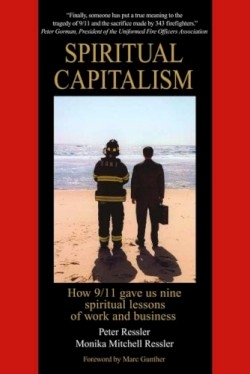Spiritual Capitalism
How 9/11 gave us nine spiritual lessons of work and business
- 2007 INDIES Finalist
- Finalist, Body, Mind & Spirit (Adult Nonfiction)
- 2007 INDIES Finalist
- Finalist, Self-Help (Adult Nonfiction)
From Alfred P. Sloan of General Motors to the silver screen’s iconic corporate raider Gordon Gecko the masters of finance and industry have excused the human costs of business decisions as irrelevant. Spiritual Capitalism written by longtime Wall Street insiders argues “The claim that what we do in business is not personal is a deliberate deception.” When the World Trade Center was leveled in 2001 so too was the economic hierarchy of New York. The Resslers’ executive search firm practically flatlined as did so many others giving them time to reflect and arrive at an unexpected perspective. They came to believe that the abuses people lump under the sorry disclaimer of “that’s just business” don’t need to happen. Now they caution against hubris writing “…the indifference of business to the larger community compromises our own well-being.”
Valuing dollars over lives as levee engineers and government officials did in New Orleans causes unnecessary deaths. Underlying the call for all people of good intention to carry individual senses of honor into the workplace is a belief that most want to do right by others. The Resslers wish to eliminate callous and underhanded business practices by incorporating firefighters’ commitment to saving strangers from disaster and to always carry a fallen colleague. It is easy to see how the spirit of mutual aid impresses but the firefighter’s code has nothing to do with profit; it’s light years from the public’s understanding of predatory Wall Street standards. Practical changes suggested in the appendix are laudable in scope yet the synthesis of suits and firesuits is a flawed proposition.
Firefighters’ seemingly limitless heroism garners rightful praise as do billionaires who put their personal resources back into society people like Oprah Winfrey Bill Gates and Warren Buffett. New York Mayor Michael Bloomberg is raised up as “…the kind of billionaire that made being rich a noble calling.” Companies singled out as leading ethical employers include the coffee juggernaut Starbucks who was fined 100 million in 2008 for paying managers salaries from the tips of hourly workers. In fairness it appears the examples were chosen in 2004. The list of good corporate citizens is shorter than the authors’ optimism would dictate.
The authors’ main business is RMG Search a Wall Street executive recruitment firm in the financial services sector. They also rehabilitate real estate properties with crews of off-duty firefighters. Peter now serves as a volunteer firefighter.
Spiritual Capitalism‘s polemical argument is direct unselfish and even a little brave given the power of the opposition. Dishonest practices and exploitation for profit are roundly condemned but if “…all jobs have equal spiritual value” then how slanted should the pyramidal structure of capitalism be? The authors have difficulty settling on a definitive answer. Ideological contradictions linger but this book holds true transformative power. Business leaders must begin to see the benefits of ethical behavior; it’s in their best interests to own the effects of decisions and factor humanity back into the equation.
Reviewed by
Todd Mercer
Disclosure: This article is not an endorsement, but a review. The publisher of this book provided free copies of the book and paid a small fee to have their book reviewed by a professional reviewer. Foreword Reviews and Clarion Reviews make no guarantee that the publisher will receive a positive review. Foreword Magazine, Inc. is disclosing this in accordance with the Federal Trade Commission’s 16 CFR, Part 255.

